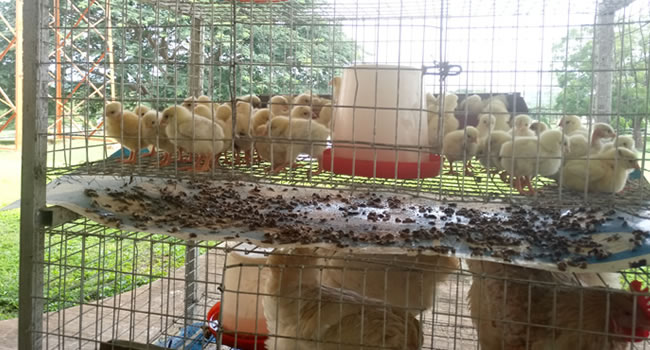Tech
FUNAAB researchers develop first improved indigenous chicken breed

Scientists at the Federal University of Agriculture, Abeokuta have reportedly developed the first improved indigenous chicken breed after 24-years of extensive research.
This was made known by Prof. Kolawole Salako the Vice-chancellor of the institution, while briefing journalists about the breakthrough of the first improved indigenous chicken breed called the ‘FUNAAB Alpha.’
Speaking at the presentation of a certificate of ‘FUNAAB Alpha’ by the National Centre for Genetics Resources and Biotechnology, Prof. Salako said the locally-bred chickens were developed after 24 years of rigorous selection, cross-breeding, as well as on-station and on-farm testing across five agro-ecological zones of Nigeria.
He said the latest discovery was achieved under the headship of a distinguished animal breeder, Prof. Olufunmilayo Adebambo.
Read also: Ban killer robots now before it is too late, Amnesty Int’l tells UN
Salako said, “Under her headship, she was challenged to work on animal breeds that would be acceptable to Nigerians. She took up this challenge in 1994 to work and develop the local chicken breeds of Nigeria to international standard.”
The VC said the dual purpose breed of chicken which has been tested in rural households is suitable for egg production and poultry meat. He also said they were of hybrid yield in all forms, and had low fat.
He said, “It was tested from September 2016 to December 2017, and was found to be one of the breeds preferred for egg production under semi-scavenging and scavenging conditions.
“It is worth noting that the broiler breed, also developed for commercial meat production, attains 1.5kg at eight weeks of age, white-skinned, low-fat with tough tastier meat produced for Nigeria cuisine.
“In the same vein, the dual purpose FUNAAB Alpha attains 2.1 to 2.6kg at 20 weeks for males, 1.6 to 1.8kg for females, while eggs were improved from white to brown from 39g to 55g and from 60 to 120 eggs per annum to 200 to 250 eggs per annum.”
RipplesNigeria… without borders, without fears
Click here to join the Ripples Nigeria WhatsApp group for latest updates.
Join the conversation
Support Ripples Nigeria, hold up solutions journalism
Balanced, fearless journalism driven by data comes at huge financial costs.
As a media platform, we hold leadership accountable and will not trade the right to press freedom and free speech for a piece of cake.
If you like what we do, and are ready to uphold solutions journalism, kindly donate to the Ripples Nigeria cause.
Your support would help to ensure that citizens and institutions continue to have free access to credible and reliable information for societal development.






















